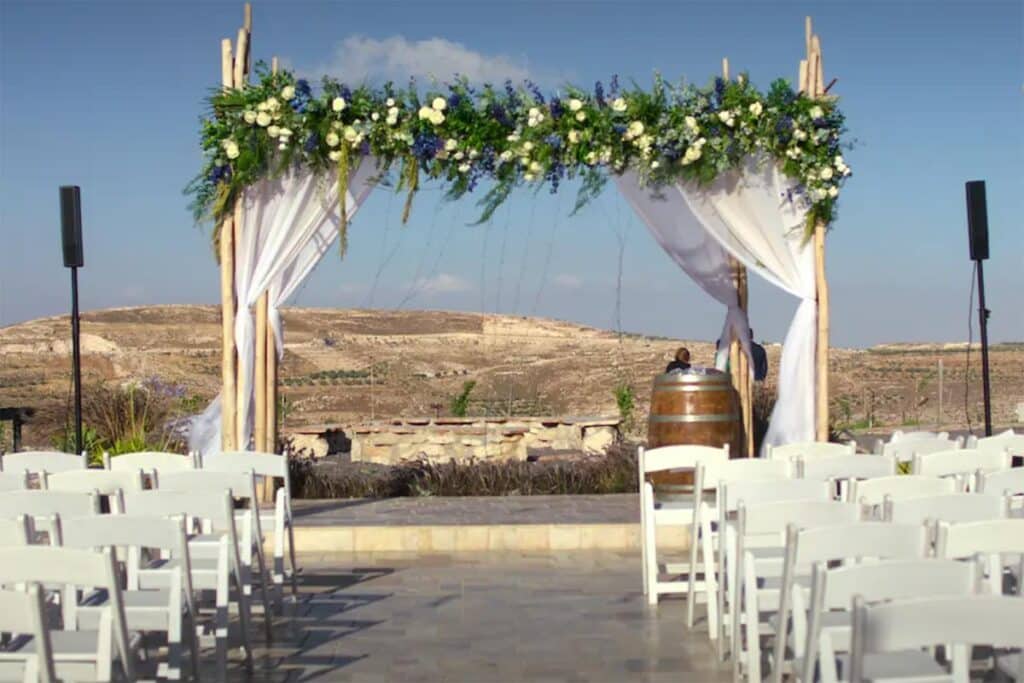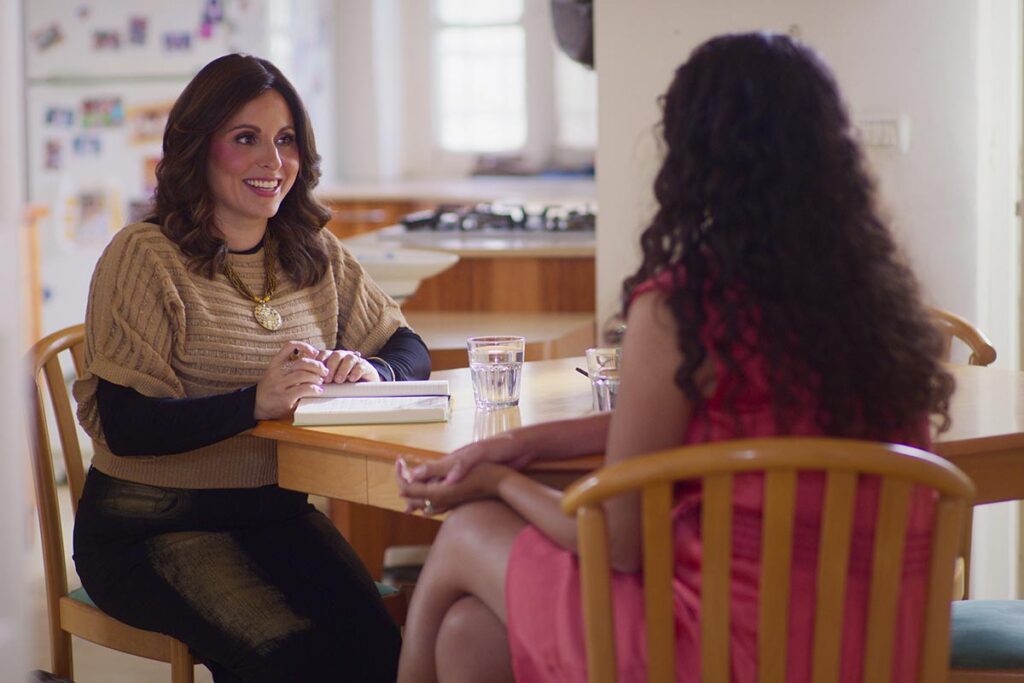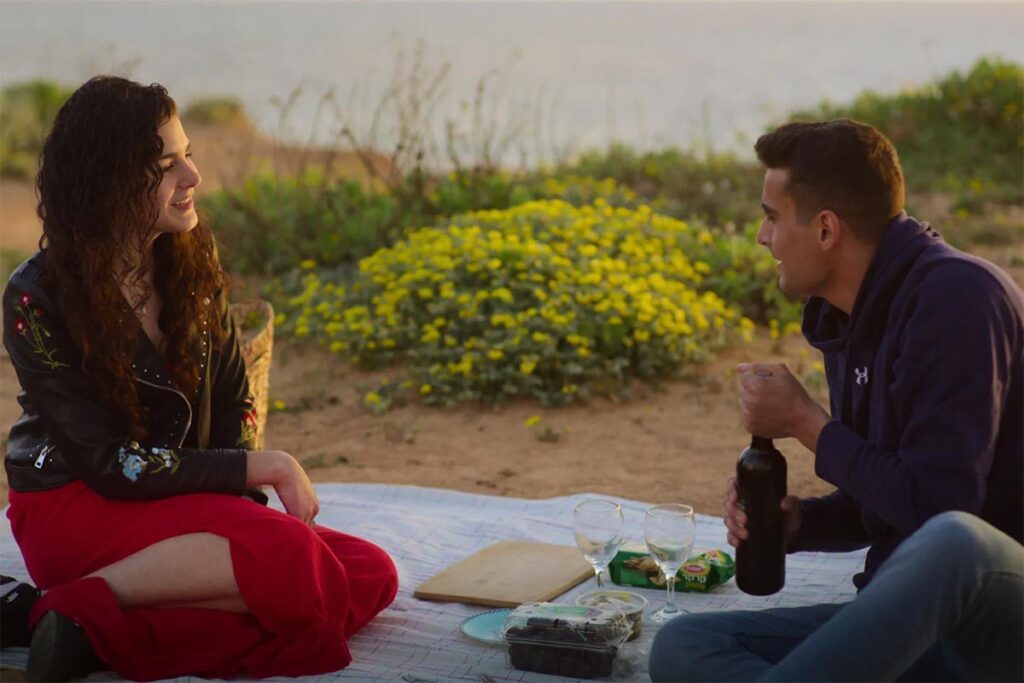We’re curious…
Jewish matchmaking is all the rage after the Netflix show starring Aleeza Ben Shalom premiered last week.
On one level, it makes sense. Reality dating shows have captivated millions of viewers ever since the genre began decades ago.
But until now, there hasn’t been a whole lot of Jewish representation on shows like this. With the popularity of Jewish and Indian Matchmaking on Netflix, it raises the question: Is the timeless tradition of matchmaking the future of dating?
What even is Jewish matchmaking?
But first, what exactly is the tradition of Jewish matchmaking? It’s a loaded term with lots of preconceptions — you might think of the matchmaker Yenta from “Fiddler on the Roof.”
But it’s a lot more complicated than that. In Judaism, marriage is a holy union and matchmaking is an honorable practice.
According to Rabbi Maurice Lamm, the word “shidduch” “implies a sense of tranquil arrival for two people tired of the dreams, the frustrated expectations, and the long search for a loving spouse.”
The matchmaker is the one who arranges these peace-giving unions, and it’s a tradition that is as old as humanity itself. You could say that the first matchmaker was God when He set up Adam and Eve.
After that, it was Abraham’s servant, Eliezer. In Bereshit/Genesis 24, Abraham sends him to find a wife for his son Isaac.
Eliezer asks God to give him a sign when he has found the right woman and immediately meets Rebecca at a well. She proves her kind and generous qualities, and as they say, the rest is history.
Although the matchmaker facilitates the process, they are seen as carrying out a divine will. The popular expression, “marriages are made in heaven” comes from the Talmud (Sotah 2a), which says God determines who every person’s future mate will be.
(Read more about that later when we explore the misunderstood concept of “beshert,” meaning “destiny” or “soulmate.”)

According to the second-century sage Rabbi Yosi, ever since the creation of the world, God has been making matches.
As the story in Bereshit Rabbah 68:4 goes, a Roman matron once asked Rabbi Yosi, “How has God been spending His time ever since He created the world?”
Rabbi Yosi replied: “God sits on the Heavenly Throne and makes matches: the daughter of this one to that one…”
The sages of the Talmud go so far as to say that matching a couple together well is as difficult of a miracle as splitting the Red Sea (Sotah 2a).
Ben Shalom invoked this when she said on the show: “Finding your person is the hardest thing to do in the entire world — and that’s where I come in…I have the hardest job in the world.”
In recent years, there has been discussion about a “shidduch crisis” among young people in the Orthodox community, especially women, who are having trouble finding suitable marriage partners.
Although there is a debate about whether the crisis actually exists, it has sparked discussions within the Orthodox community about the best way to address these challenges and promote successful matchmaking.
A new approach to traditional matchmaking
Some have noted that previous shows like “Shtisel” and “Unorthodox” have portrayed Jewish matchmaking in an oppressive, negative light.
The Netflix reality show “My Unorthodox Life,” released in 2021, sparked discomfort and objections about how the Orthodox community is portrayed on screen. In response, a group of Orthodox women started a hashtag campaign #MyOrthodoxLife to show how the show’s portrayal of them was a far cry from reality.
But many commentators have argued that “Jewish Matchmaking” strikes a different tone. “Not all the participants are observant, but they’re all portrayed positively and they’re all proudly Jewish,” Ben Shalom said. “No one is a caricature and there are no stereotypes. This is a first in reality TV, and frankly a triumph.”
Meanwhile, in a Times of Israel blog post, Jerusalem-based content creator Tzipora Lifchitz offered a different perspective.
She argued that the process in some Orthodox communities can be “minimizing and degrading” because it is all about “conformity to external standards.” In contrast, “Aleeza the matchmaker embraces the individuality and uniqueness of her clients” and could be a “role model” for other matchmakers.
In an NBC News interview, Ben Shalom recently explained: “My approach is very simple, it is a very non-judgmental, open, accept-everyone-for-who-they-are approach, and so all the details — it doesn’t matter who you are. It matters that I understand who you are so I can bring you a match that is appropriate for you.”
While some admire this approach, others argue that she takes it too far, and could be slightly more critical of her clients when necessary.
I loveeeee the matchmaker! She's so likable and very supportive of her clients unlike a certain someone in a similar franchise😂#jewishmatchmaking
— Chloe (@mateimnotmagic) May 3, 2023
As a non-Jewish person watching #JewishMatchmaking, I can see that @AleezaBenShalom genuinely tries very hard to not judge her clients for their sometimes quirky requirements. She accepts her clients as they are, and they are so lucky to have her. A very enjoyable show indeed.
— Hello Newman (@goodbyenorman) May 5, 2023
“There’s more of a chance of her eating a bacon sandwich than bad-mouthing one of her clients,” Haaretz columnist Adrian Hennigan quipped.
But Ben-Shalom said she believes this approach would resonate with a broad audience, saying:
“I’m hoping that people will see that matchmaking and Judaism is not just something that’s old, but that’s timeless, that’s relevant. We can use this beautiful, ancient tradition of matchmaking and bring it to modern life…It’s universal.”
Why are matchmakers relevant in a world of dating apps?

In a world of dating apps, matchmaking makes the process more personalized and manageable, Ben Shalom explained.
“I like that people narrow in on what they want, and then look for specific details that would help them find that person, which means you’re going to say no to about 90% of the people. We’re going to filter and look at about 10% so that you don’t get dating fatigue or burn out,” she said.
Alessandra Conti, owner of Matchmakers in the City based in Beverly Hills, added:
“In a meeting between a client and a matchmaker, critical questions are brought up that many are curious to ask on a first date, but avoid asking, such as moral values that are important to us as a partner, religious affiliation, political opinion, and even how many children we want. A matchmaker filters these questions in advance and saves a lot of headaches.”
Beyond the matchmaking tradition, Aleeza said, Judaism also offers practical dating advice for everyone.

“One of the biggest tips that I think resonated with me the most was it does not need to be love at first sight,” Noah Del Monte, a participant on the show, told i24 News.
“You need to get to know that person and maybe that’s where it comes from, ‘date ‘em until you hate them.’” You know, you have to give people more than just one or two days to see if you actually want to be with this person.”
3 takeaways: What does Judaism say about dating?
It’s clear that traditional matchmaking has some modern-day advantages. Will it make a comeback in an age of social media and dating apps?
It remains to be seen, but if the response to “Jewish Matchmaking” is any indication, we think most would agree that the potential exists. Why? Because Aleeza Ben Shalom is right — Judaism has real wisdom to offer the world.
1. “Beshert” implies hopeful anticipation about the future, not resignation.
We know we’re waxing poetic but stay with us on this one. The show “Jewish Matchmaking” highlights the distinction between two related yet different ideas: “kismet” and “beshert.”
Kismet, originating from various Eastern cultures, suggests that events in one’s life are predetermined by fate or divinely ordained. Kismet is often associated with a sense of resignation to one’s destiny, and the actions of any one individual are in many ways immaterial.
Beshert, on the other hand, is a Jewish idea about finding one’s soulmate or destined partner in life. On the surface, it may seem similar to “kismet,” but it’s actually different.
While “besert” implies that there is a divine plan or purpose for each person’s life and that their soulmate is predestined to cross their path, it is not associated with resignation, but rather with hope and anticipation.
It says that every person has a unique role to make things happen. It is not a passive concept, but in many ways, it’s actually active. Each person has a role to play in making their beshert happen instead of merely waiting for life to unfold.
2. Making ideal matches really is as miraculous as Ben Shalom says.
Matchmaking really is a difficult task. Think about it: you are bringing together two individuals with different families, backgrounds, life experiences and personalities and asking them to build a fulfilling life-long relationship and family together.
If you’ve ever witnessed an inspirational wedding ceremony or observed a couple who has been happily married for decades look at each other, you know that this is so special. So, if you ever get the chance to set people up, go for it! Make it happen! Be a “matchmaker” and connect people.
However, there’s one more crucial point to keep in mind: it’s the job of the couple to create a marriage that is as extraordinary as the splitting of the Red Sea. When a couple invests in their relationship and puts in the necessary effort, the result can be nothing short of miraculous.
3. Love is not just a feeling, it’s an investment.
You may have heard a myth surrounding Orthodox Jewish couples that they meet only three times before getting engaged and married, and fall in love afterward.
Although that’s true for a small minority in the community, in reality, there are actually lots of ways Orthodox couples meet. But there is some truth to the idea that love can grow over time, especially when we are in the right relationships and utilize the appropriate tools.
Like any other relationship, the key to success is investing in it with effort and commitment, and that investment can often lead to even more love.
But, it’s not an easy feat to accomplish. The truth is that matchmaking is just the start, and the investment in the relationship is what it’s all about. That’s when miracles happen.
